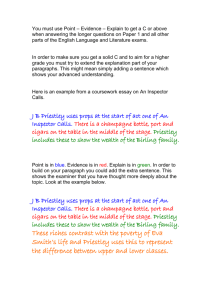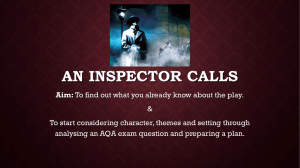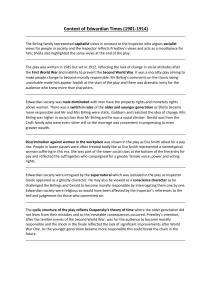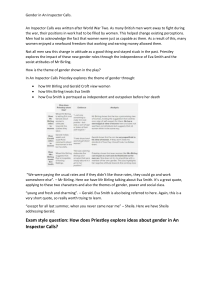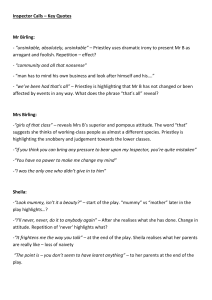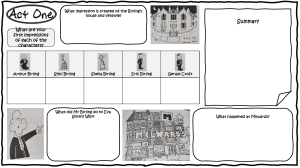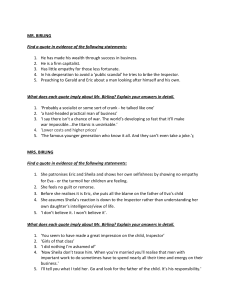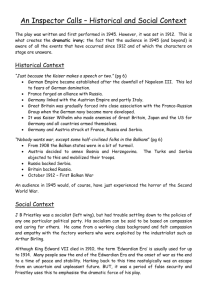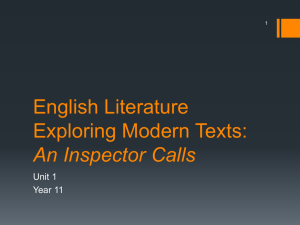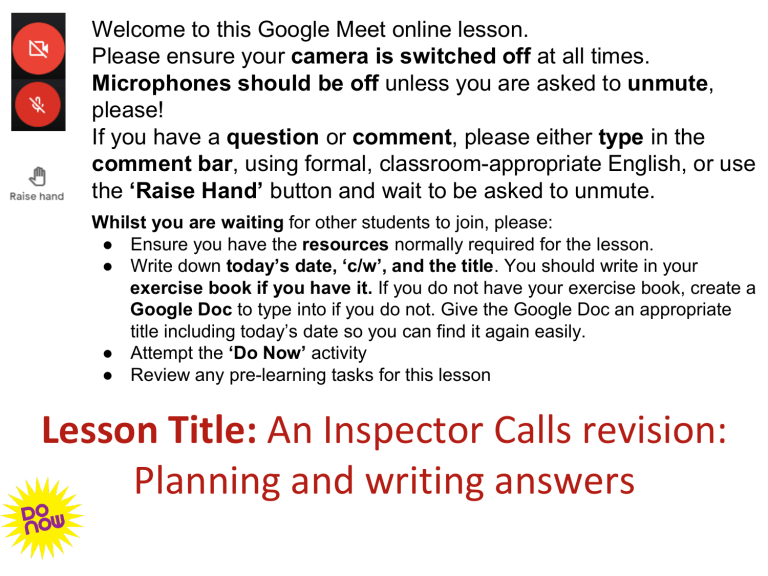
Welcome to this Google Meet online lesson. Please ensure your camera is switched off at all times. Microphones should be off unless you are asked to unmute, please! If you have a question or comment, please either type in the comment bar, using formal, classroom-appropriate English, or use the ‘Raise Hand’ button and wait to be asked to unmute. Whilst you are waiting for other students to join, please: ● Ensure you have the resources normally required for the lesson. ● Write down today’s date, ‘c/w’, and the title. You should write in your exercise book if you have it. If you do not have your exercise book, create a Google Doc to type into if you do not. Give the Google Doc an appropriate title including today’s date so you can find it again easily. ● Attempt the ‘Do Now’ activity ● Review any pre-learning tasks for this lesson Lesson Title: An Inspector Calls revision: Planning and writing answers An Inspector Calls revision: Planning and writing answers L.O. I can create a plan and use it to write an effective answer. List the areas of knowledge and skills for Literature Paper 2 you are confident in, and those you aren’t. Create a ‘To Do’ list of revision topics. Literature Paper 2: ● A: An Inspector Calls ● B: Power & Conflict poetry ● C: Unseen poetry Planning your answer Look at the practice question below. How would you answer this? How does Priestley present Mr Birling in the play? Task Think about points you could make in answer to this question. Include: ● A thesis (a general, short answer to the question). ● Three separate, specific points in answer to the question. You could have put… Point 2: he doesn’t see his employees like Eva Smith as real people - they were commodities that were easily dispensable. Point 1: his foolish arrogance is evident from Act One, with his confident statements, which the audience know are incorrect. How does Priestley present Mr Birling in the play? Point 3: by Act Three, whilst his children have learnt lessons, Mr B remains unrepentant and only concerned about his reputation. Thesis: Arthur Birling is used by Priestley as a symbol of the ignorant upper class capitalists of the Edwardian Era, in order to promote his Socialist viewpoint as a better way to live. Let’s remind ourselves about our work on quotations from last lesson… Reminder How does Priestley present Mr Birling in the play? Inferences: arrogant, foolish, ignorant, confident Context: written in 1945 (set in 1912) so the audience know he was wrong (2 world wars) – Priestley’s tool to make him appear foolish ‘Fiddlesticks! The Germans don’t want war. Nobody wants war.’ Writing it up: Now let’s see how this can become a full paragraph… Methods: exclamatory / short sentence, repetition, lack of modal verbs, dramatic irony Linked quotation: ‘‘The famous younger generation who know it all.’ (Act 3) – sarcastic tone; ironic How does Priestley present Mr Birling in the play? S P E E D In Act One, Priestley establishes the character of Mr Birling as one who is arrogant and misguidedly self-assured in his views. When Birling dismisses Eric’s concerned questions about the possibility of war, with ‘Fiddlesticks! The Germans don’t want war. Nobody wants war.’, we see how patronising he is to his son who is, ironically, right to be concerned as the first world war would begin two years later. Priestley uses repetition and short, blunt sentences here to convey Birling’s over-confidence, and the condescending exclamation ‘Fiddlesticks!’ further adds to Priestley’s portrayal of Mr Birling as a foolish and ignorant member of the Capitalist upper classes. Priestley ironically continues Birling’s extended monologue with him patronisingly telling Eric ‘You’ve a lot to learn’: something which the audience see at the end of the play is something which Birling himself fails to do. In Act 3, Birling sarcastically refers to the ‘famous younger generation who know it all’: not only has he failed to learn from his own mistakes, but he is still mocking those who have. For an audience in 1945, who had just seen the end of a second world war, the dismissive Mr Birling becomes an extremely unlikeable character. Priestley has used this dramatic irony to create this response in his audience from the beginning of the play, as it helps to promote his socialist message. Task Write a full SPEED paragraph for point 2 and point 3. To help you, use: ● this plan ● the model SPEED for point 1. Point 2: he didn’t see his employees like Eva Smith as real people - they were commodities that were easily dispensable. Point 1: his foolish arrogance is evident from Act One, with his confident statements, which the audience know are incorrect. How does Priestley present Mr Birling in the play? Point 3: by Act Three, whilst his children have learnt lessons, Mr B remains unrepentant and only concerned about his reputation. Thesis: Arthur Birling is used by Priestley as a symbol of the ignorant upper class capitalists of the Edwardian Era, in order to promote his Socialist viewpoint as a better way to live. Priestley uses the character of Mr Birling to convey a character of naivety and as an anti-role model character. This can be seen when he says ‘You can ignore all this silly pessimistic talk” He says to ignore the rumours of a war happening which is quite ironic as we know that after there were actually ww1 and an additional ww2 which exaggerates the irony and Mr Birling’s ignorance. It also conveys his naivety as he calls it ‘pessimistic talk’ and completely disregards the rumours of a war which just shows that he is quite naive of what’s going on and calls it ‘silly’ further signifying his ignorance. This conveys him as an anti-role model character since Priestley’s views were all about being aware of whats going on and actually caring while Birling disregards it and of which (not directly) follows a war signifying the importance of socialism. Writing task Now practise by creating a plan and a SPEED paragraph for a different character. Quotation bank PLAN How does Priestley present _______ in the play? your chosen character _______________ S _______________ _______________ P _______________ E _______________ _______________ E _______________ D _______________ Homework Complete the set ‘An Inspector Calls’ assignments on Century. Point 1 : A suspicious and strange character as shown in the quote “half shy half assertive” Point 3: Later shown as a person who changes throughout the play from irresponsible and unsure to confident, knowing and responsible as show from the fluctuation of his tone and what he says compared from the beginning to the end. Point 2 : a representation of the young rich in society who do what they want with no consequences while the authoratives pay no attention to and paint them as innocent shown as when it is revealed that he impregnated daisy renton How does Priestley present Eric Birling? Priestley uses the character of Eric Birling as representation of the young rich in society who do what they want with no consequences while the authoratives pay no attention to. This is shown when he says ‘You already know don’t you’ this is the point of climax at the end of act 3 where the curtains fall. This is when the Birlings except for Sheila, realise that Eric was the one that impregnated Eva. This sudden arrival and quote of Eric may have also shocked the reader and possibly made them realise that it was him although it was heavily foreshadowed that it was Eric before he even came back. The shock shown by the elders of the Birling family shows that even the rich youth of society are not innocent and still harm society and so Priestley uses this to convey the idea of taking more care of the youth of today and correcting and teaching them. This supports Priestley’s socialist views which were of being more aware of society and taking care of it and so uses Eric to highlight the care of youth in society and to stop neglect towards them.
